I’m Still Learning Anatomy Myself So I Wouldn’t Use This As More Than Just A General Tip But….
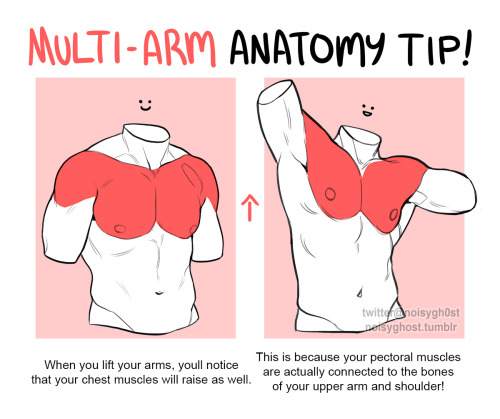
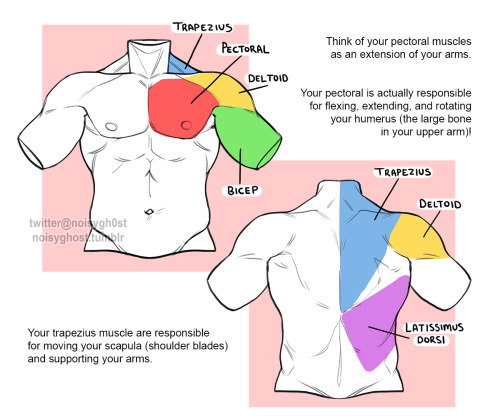
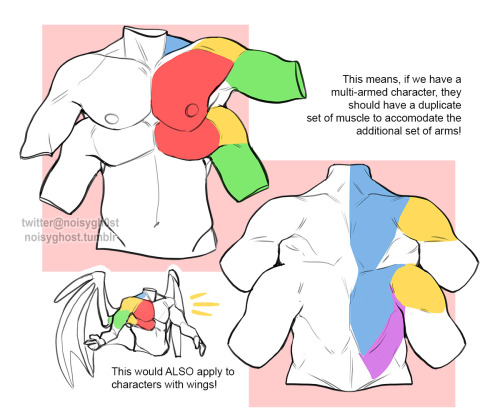
i’m still learning anatomy myself so i wouldn’t use this as more than just a general tip but…. I am fascinated by speculative monster anatomy and this is something i discovered years ago and thought i would impart amongst my fellow monster enthusiasts :)
mind you, the second set of pectorals can look kind of funky so i understand aesthetically why people would prefer not to draw them but! if you are someone interested in anatomy, i think this is a thing people dont really think about when giving their OCs wings/extra limbs and i think it’s kind of neat!
More Posts from Aether1984 and Others
As far as I can see you've found my refs helpful. Here's one more)

PS: Hope someone will notice this post too, not only previous, hah.


I made some tips on how to draw eyes in a side profile. I am not a professional artist.
How do you draw unkempt hair in a more simple style? I have a character who the most he does is probably brush his fingers through it but I can't draw him not looking like he has nicely styled wavy locks.
Using a variety of hair textures and abstract hair shapes can help create the messy effect you want;
Here’s an example for hair textures, The left is a full head of curly hair; on the right I made some generals shapes on the base to guide where the textures would change, this could be as smile and complex as you want!


If your character reference doesn’t allow for different hair textures, you can always try building abstract or conflicting shapes out of the hair itself. Long hair which is messy generally has lots of fly-aways you can shape, as well as crude edges or bunching together at random. Short hair is more diverse in my opinion, it depends on the texture and the cut, but I would try to group part of the hair together at random, and direct the shapes to give a sense of asymmetry to the silhouette. The simpler your style needs to be, the fewer general the shapes you may want to build into the body of the hair.

I hope this gives you some fun ideas!
(With Love from Mod Koikro55)
Making this guide because I see this question time and time again on here. This post is mostly directed at white artists and writers who are wondering how to best design their characters of color. Full text description is at the end under the cut.




Full disclaimer, I am biracial (mixed E/SE asian and white) and grew up in majority poc communities, but I am just one person and this post is only based on my own experiences. If any other poc want to chime in, feel free to do so.
Once again, a full plaintext description is under the cut. If you find the information useful, please pass it on by reblogging <3
(Finally, even though I spoke vaguely on genetic inheritance, this is NOT the place to comment on certain features being mutations, as if being a mutation means something is inherently lesser or isn’t supposed to exist. Mutations is everything! All of our traits were at some point or another, an emerging mutation. Love yourself ^__^)
Keep reading
Any posts about drawing necks that connect to the body?

OP: https://twitter.com/Manga_Materials

OP: http://fav.me/dco47xm

By kelpls on tumblr!
The question is a little vague, but I hope this helps! I found these on pinterest and couldn’t track the OPs. Please lmk who the artists are if you know!EDIT: Added credit!
yesterday i reblogged a drawing resource that included how to draw hijabs - and it honestly wasn’t the best advice i’ve seen out there
now, i’m not an artist. but what i saw was a video that included hijab styles most of us don’t really wear and incorrect terminology surrounding niqabs and burqas (yes, there is a difference between the two)
so, i went searching and found a tutorial that i felt was better! these drawing guides and examples come from @/winchestermeg on twitter, and i think they’re really great 💕







this has more relevant examples and correct terminologies, and is drawn by a muslim woman
enjoy, artists of tumblr!
do you have any advice on how to draw armor?? please im dying
yeas <3 so right off the bat i think its important to state but my like. basis from drawing armor is almost completely off of my history of drawing soulsborne characters...... i have a disease, but anywyas yea. i highly recommend it for explorations of interesting yet accurate armor design :-) my favorite designs are from 2 and demons, and i steal a lot of inspiration from their concept art. i simply think it should be ok to take how you draw/view armor or something like that from something else. armor is goofy just draw whatever looks cool.
how i draw armor is basically separating it into sections to focus on ..

heres a lionel fr ref. layering is really important i think. i usually just kinda mix up what exactly i have fr each bit but uhhh that works.

from there its just shoving random metal, a cape, and some other doohickeys on top. i recommend looking at either preexisting armor or video game/tv show/what have you armor designs you like and just taking bits from it to make your own :-)

for gauntlets and the like i usually just simplify it to the point of pointing out where the knuckles are. theyre pretty simple to just shove shit on top of to mkae fancier but theyre super basic. sabbatons too you can get away with just showing where the foot will bend cus they got sooo many segments. think worms. worm shoes.
other than that. if u dont wanna draw a bit just shove a cape on top. i promise no one will notice. people will think its cool. capes always improve a design. i draw every single character with armor with a cape so i dont have to draw it sometimes. or so i just have to draw hints of it. its fine cheating is epic.
uhhh thats kinda all my off the top of my head tips i hope any of them help feel free to ask more specific shit im not good at teaching shit like this :pensive:
So I asked a couple jokes earlier but if you're still giving advice - how is it you simulate a painted texture in digital art? Like, I dont understand the jump from sketch to pretty artwork??? Or just colouring in general tbfh
there’s no jump at all, more like steps. base color, shading, blend shading, more shading, highlights. it’s really simple, honestly.


you can leave the colors as a base, but if you want, you can add shadows.



for maximum impact on the shadows, make sure the blended shadows are of a similar hue to the base colors, and the cel shadows are a color that’s opposite on the color wheel. for example, here i used mostly warm colors like brown and peach for the base and blend, but with the cel i used a cool color, blue.

and you’re done!! if you want more of a painting-ish style, use textured brushes or watercolor brushes and lots lots more blending with them. keep in mind where the curves and shapes of your subject are, and use your light source to your advantage. color theory is also good to know! hope this helped some!
hi! umm pls pls PLS if you have the time, do a thingy on arms when you get the chance, they are so hard i could almost cry aslkdjaskjsas, i keep forgetting how many curves an arm should have/how long it should be (in diff positions/when it's not resting at the hips) etc etc etc ahhh omg please!! thank you sosososo much, i l♡ve all of your art and i hope you have a nice day!! ✧ ㅠㅠ ✧






I don’t want to go into detail in terms of muscles, but I’m sure you can find them if you google arm muscles! Hope this helps u out a little!
Drawing Heads and Faces: Cheekbones

I’ve found that drawing the head starts to make a lot more sense once you start thinking about cheekbones and cheeks, and how the fit into the head structure.
You might be aware of the Mysterious Indent that Looks Good Next to the Outer Part of the Eye, or the Mystery Indent for short.
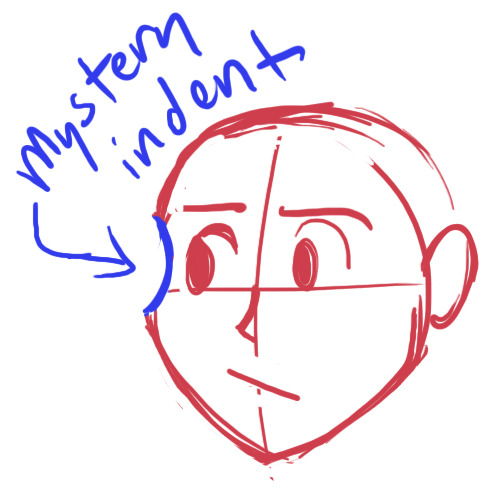
Drawing a Mystery Indent may serve you fine if you only draw the head from flat angles, but it falls apart when you get adventurous.

Why isn’t this making sense anymore?
Drawing a ‘Mystery Indent’ is an attempt to imply cheekbones without knowing how they actually incorporate into the skull, and this is why it looks so unconvincing when you use it to draw the head in anything other than ¾ view.
The cheekbones wrap around the head and eye sockets from above the bridge of the nose. The concave you draw if you draw the ‘Mystery Indent’ is a misunderstanding. There is no concave. You should instead be thinking of this as where the eye socket/brow overlaps the (convex!) cheekbone.


Compare the cheekbones on both sides for placement. They should match up and correspond with each other.
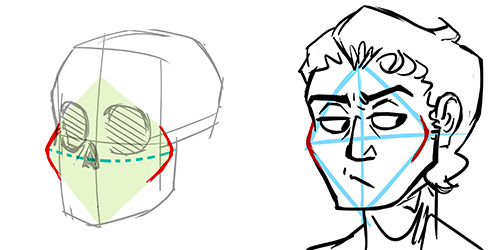
(Knowing cheekbone structure helps when drawing gaunt characters, because their cheekbones may stick out. Remember to compare the cheekbone placement on both sides!)
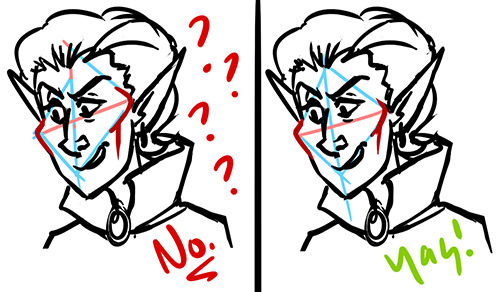
* This is part of a much larger tutorial I’m working on about head, face, and facial feature structure. Hopefully more to come eventually?
-
 wander-over-the-words reblogged this · 1 month ago
wander-over-the-words reblogged this · 1 month ago -
 goober1611 liked this · 1 month ago
goober1611 liked this · 1 month ago -
 bloopbloopbliep liked this · 1 month ago
bloopbloopbliep liked this · 1 month ago -
 clowny-bitch-lamb liked this · 1 month ago
clowny-bitch-lamb liked this · 1 month ago -
 m4y4fun liked this · 1 month ago
m4y4fun liked this · 1 month ago -
 riddlers-titties liked this · 1 month ago
riddlers-titties liked this · 1 month ago -
 constellar-y liked this · 1 month ago
constellar-y liked this · 1 month ago -
 asterraccoon reblogged this · 1 month ago
asterraccoon reblogged this · 1 month ago -
 asterraccoon liked this · 1 month ago
asterraccoon liked this · 1 month ago -
 sullina reblogged this · 1 month ago
sullina reblogged this · 1 month ago -
 moonmacabre01 reblogged this · 1 month ago
moonmacabre01 reblogged this · 1 month ago -
 d8tl55c liked this · 1 month ago
d8tl55c liked this · 1 month ago -
 my-t4t-romance liked this · 1 month ago
my-t4t-romance liked this · 1 month ago -
 sigmaelxgr liked this · 1 month ago
sigmaelxgr liked this · 1 month ago -
 fandomsearcher-stuff reblogged this · 1 month ago
fandomsearcher-stuff reblogged this · 1 month ago -
 fandomsearcher-stuff liked this · 1 month ago
fandomsearcher-stuff liked this · 1 month ago -
 beetleskeleton liked this · 1 month ago
beetleskeleton liked this · 1 month ago -
 mosstheboar liked this · 2 months ago
mosstheboar liked this · 2 months ago -
 tendergothic reblogged this · 2 months ago
tendergothic reblogged this · 2 months ago -
 tendergothic liked this · 2 months ago
tendergothic liked this · 2 months ago -
 gryphonsoup liked this · 2 months ago
gryphonsoup liked this · 2 months ago -
 hughjazzinthehouse liked this · 2 months ago
hughjazzinthehouse liked this · 2 months ago -
 shadylex reblogged this · 2 months ago
shadylex reblogged this · 2 months ago -
 throughtrialbyfire reblogged this · 2 months ago
throughtrialbyfire reblogged this · 2 months ago -
 smalltimecia reblogged this · 2 months ago
smalltimecia reblogged this · 2 months ago -
 greyborn2 liked this · 2 months ago
greyborn2 liked this · 2 months ago -
 ookinky liked this · 2 months ago
ookinky liked this · 2 months ago -
 tearinglight reblogged this · 2 months ago
tearinglight reblogged this · 2 months ago -
 megxolotl reblogged this · 2 months ago
megxolotl reblogged this · 2 months ago -
 crynwr-drwg reblogged this · 2 months ago
crynwr-drwg reblogged this · 2 months ago -
 puzzlevision liked this · 2 months ago
puzzlevision liked this · 2 months ago -
 roseyfeatheredking liked this · 2 months ago
roseyfeatheredking liked this · 2 months ago -
 procrastinator-cutie13 liked this · 2 months ago
procrastinator-cutie13 liked this · 2 months ago -
 akeema88 liked this · 2 months ago
akeema88 liked this · 2 months ago -
 n0ts0friendlygh0st liked this · 2 months ago
n0ts0friendlygh0st liked this · 2 months ago -
 shadowolfs liked this · 2 months ago
shadowolfs liked this · 2 months ago -
 gamerxchan liked this · 2 months ago
gamerxchan liked this · 2 months ago -
 clockworkinspiration reblogged this · 2 months ago
clockworkinspiration reblogged this · 2 months ago -
 clockworkfountain liked this · 2 months ago
clockworkfountain liked this · 2 months ago -
 loaf-corner liked this · 2 months ago
loaf-corner liked this · 2 months ago -
 napaula-1-spider liked this · 2 months ago
napaula-1-spider liked this · 2 months ago -
 leafuuyay liked this · 2 months ago
leafuuyay liked this · 2 months ago -
 whats-in-the-pantry reblogged this · 2 months ago
whats-in-the-pantry reblogged this · 2 months ago -
 mysterious-shadow-dragon liked this · 2 months ago
mysterious-shadow-dragon liked this · 2 months ago -
 crynwr-drwg liked this · 2 months ago
crynwr-drwg liked this · 2 months ago -
 nekrops-shaped reblogged this · 2 months ago
nekrops-shaped reblogged this · 2 months ago -
 nekrops-shaped liked this · 2 months ago
nekrops-shaped liked this · 2 months ago